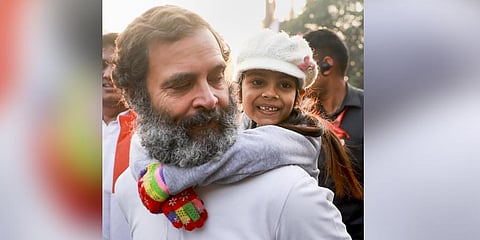

A walk is a modest event, a quiet effort that cleanses the spirit. It is a physical act that reaches the level of the spiritual as a pilgrimage. A pilgrimage as an encounter with the other is eventually an attempt to discover the self. A walk cleanses the self and is an invitation to the community. As an act of solidarity, it is exhilarating.
As an animated event, it becomes a drama. An increase in pace, it becomes a march, and accelerated further, it is an act of aggressive goose-stepping. Choreographed right, it becomes a forum of conversation and cleanses protest. In that sense, a walk can be an everyday event and yet create history.
Rahul Gandhi’s Bharat Jodo Yatra began with little fanfare. His walk appeared humble and tentative; while Narendra Modi was literally goose-stepping into the G20 presidency, Rahul looked like he was taking an absent-minded break from politics. Initially, the media deadpanned the event, reading it as a symptom of his political weakness. Initially, he sounded like a bad actor with tired lines, invoking his family. But as he evoked his standard lines, his presentation improved.
Ideas began appearing and curiosity increased, with politicians and actors like Swara Bhasker, Kanimozhi and Kamal Haasan joining him with obvious interest. This list became a symbolic directory of intellectual and cultural support and included Pooja Bhatt, Ganesh Devy, Bezwada Wilson, Harsh Mander, and Raghuram Rajan. The intellectual quality and integrity of these individuals became testimony to this event. It was no longer about Rahul, but a ritual act, a prayer, and an appeal to India to begin rethinking and healing. A tentative Rahul had struck the right chord. One must thank these leaders because they talk of a different quality of politics that avoids the nitpicking nature of media or party leaders. For once, Rahul’s personality helped. His beard added gravitas to his persona, and his comments on Savarkar the right fuel to the fire. One suddenly sensed a different man, a different event.
ALSO READ | The Congress Rahul walks away from
What began as a boy scout act of diffident innocence suddenly acquired a dramatic power; it became a series of cameo events of anticipation. Even if Rahul occasionally stumbled, the retinue of supporting actors sustained the show. In fact, the BJP, in a final act of desperation, decided to invoke Covid. What worked for Shaheen Bagh failed to work for Bharat Jodo. It became a river flowing across the country, collecting gossip and inviting debate.
It was brilliantly choreographed theatre, a style of inclusive politics that was endearing and thoughtful. It was clear that Rahul was the centre, but not the centrepiece. What was central was an invitation to India to heal itself. It was an appeal to alternative politics—not as a hard sell but as a tentative experiment.
Rahul had found the right grammar of theatre, especially in how he greeted children, acknowledged the support, and hugged his mother Sonia, signalling a different exuberance and maturity.
Indian unity and the idea of India have been resonating themes. Rahul was going beyond ideologies and family, back to fundamental themes without textbook answers. As one housewife said, it was her favourite serial, invoking both the primordial and the contemporary. Visually, Rahul looked different, quieter, surer, and open-ended, not imposing idiot history but inviting people to suggest solutions and share their problems.
The sense of anticipation was more important as it struck the right musical chord. The gossip of the event and social media managed to outlast the indifference of national media. It is these gains of orality against media that will become significant for the future.
ALSO READ | Politics as a yatra without end
The India Rahul is working for is the nation, not the nation-state. He is invoking memories and folktales beyond the textbook history of the BJP. A humbler Rahul sounds like a more effective Rahul. Intuitively, Rahul’s organisers captured the rhythm and geography of the walk.
It is a pilgrimage, a set of encounters, and a celebration of the country, with every state joining in to add to the bouquet called India. This is not the ritual of cadres. Slogans varied from state to state, from event to event; there was a sense of plurality, a humility about solutions and yet a celebration of democracy. It is the setting up of a new syllabus of politics, an India imagined between Kamal Haasan and Bezwada Wilson.
Even if the walk ends here, there will be no sense of closure. It is an invitation to a manthan, a slow churning of ideas, not a collection of diktats. Even old professional Congressmen seemed surprised at Rahul’s glowing report card. Rahul needs to thank civil society for the strategic help it gave him.
One must be careful about assessing events and processes such as Bharat Jodo Yatra, as it is an open drama that can have many interpretations. It has obviously done a few things. It has shown us a different Rahul, it has given Congressmen a sense of repair, and it has brought to the fore intellectuals who see an India beyond party ideology. It has actually created a new tentative idea of India. A festival of recipes one must work at.
Democracy repeatedly demands a politics of theatre that recharges ideals, introduces new actors, and revitalises old scripts. It needs rituals which demonstrate not ready-made solutions but a different way of doing things. The ham-handedness of the media and BJP showed that it is out of touch with people. Cadres are not always an answer to politics. India is always looking for alternatives and is ready to wait for them. What is endearing is, for once, Rahul is not part of the problem but, in fact, part of the solution. One cannot ask for more from a good politician.
Shiv Visvanathan
Social scientist associated with THE COMPOST HEAP, a group researching alternative imaginations